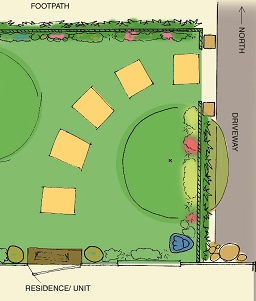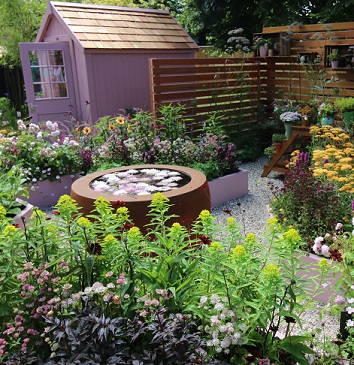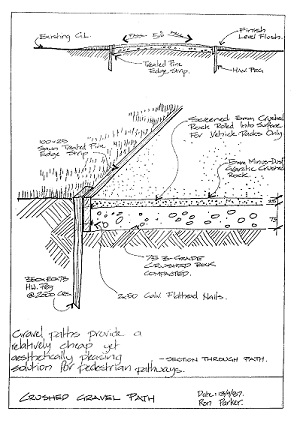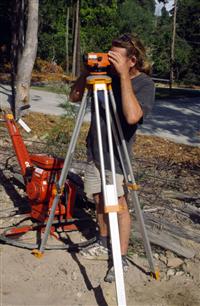Starting a Landscape Business
HOW TO START A LANDSCAPING BUSINESS?
 Employing a landscaper was once an expensive luxury; but today that has all changed.
Employing a landscaper was once an expensive luxury; but today that has all changed.
The value of using a landscape professional is much more recognised. People understand that you not only get a better job, but can also save time and money to have at least the more challenging parts of your garden designed and built by someone who has the knowledge and skill to do a proper job.
Demand For Landscape Services is Strong
To start your own landscaping business and cater to the demand that exists, it is important to first have thew knowledge and skills to do a decent job. If you don't, your work will be sub standard, your reputation will degrade, and instead of building opportunities through referral, your opportunities can decrease as your bad reputation spreads.
It is important that you recognise what you vcan and cannot do. Don't over state your capabilities; but promote your strengths, and build your skills through learning and experience so that you can expand what you offer.
How then Can You Start a Landscape Business?
Some people begin by learning some specific skills (eg. drawing a plan, laying paving, building walls or earthworks and drainage). They may kick off a business by offering a limited service in what they know aqnd can do well; then expand the services they offer into other areas of landscaping as time goes by.
Other people may begin by learning more before they even begin; then launching a business that offers a wider range of services up front. The other option is to bring in sub contractors to do the various as parts of the job, and act as a "project manager" overseeing a garden development.
Here are Some Possible Pathways to establishing a landscaping business:
Option 1. Launching with a Limited Range of Services
Set up as a "specialist" providing "niche" services to property owners, property developers and builders and sub contracting to landscape firms.
eg. Learn all about creating water gardens. Perhaps start by studying our water gardening course, and reading all you can about water gardens. Visit places that supply equipment and plants for water gardens. Visit gardens, observe, and learn from water gardens that you see. Build the ultimate water garden at your own house (or a friends), and learn from your success and failure.
Once you feel you have mastered building water gardens; set about promoting yourself as a contractor to design and build water gardens. You might do this through a web site, becoming active with social media, and approaching people who might employ you such as landscaping firms, architects and property developers.
You could take a similar approach to become a contractor who installs lawns; or someone who does stone work; or anything else.

Option 2. Launching with a Wide Range of Services
If you want to launch a business that offers a complete landscaping service; from design to installation and ongoing maintenance; you need to have a broad understanding of all aspects of the job. You may get this by working for an established landscaper for a number of years, then striking out on your own.
Alternatively you may undertake a significant training program (at least 500 hours - preferably a lot more); before launching; and initially working on smaller less complicated jobs,until you have built up some reasonable experience. Training alone is a good start; but unless experience is added to training, there can be a significant risk with more complicated or larger jobs - hence it can be better to start with smaller jobs, then gradually build the business.
Option 3. Launching as a Landscape Project Management Business
This sort of launch requires organisational skills coupled with a broad understanding of the landscape industry. You do not need to be an expert plantsman, or an expert paver or stone mason to do a good job; but you do need to know how to determine who is an expert, and communicate with them. You also need to understand enough about landscaping to know how everything should fit together; and to be able to identify issues when they arise.
Design, Construction, or Both?
There are two main types of landscaping services which you might consider. One is to design, the other to build or construct. Some landscapers do both, others might even specialise in just one aspect or style of design or of construction.
 There are many options for specialisation, for example:
There are many options for specialisation, for example:
- Small or Courtyard Gardens
- Formal Gardens
- Natural Gardens
- Water Gardens
- Vertical Gardens
- Permaculture Designs
- Budget Price Gardens
Some Designers or contractors distinguish their service by concentrating on a particular type of feature, or a particular type of plant. Options might be:
- Rose Gardens
- Food Plants
- Indigenous Plants
- Ferneries
- Paving
- Modern Gardens
- Timber structures like gazebos or pergolas
- Paved areas.
If you can develop a particularly unique skill or feature to offer clients, you may be able to create a very strong niche market. Statuary and Trompe L'Oeil (ie. Trick of the eye murals), are just two such features. I have known landscapers to be in high demand, because when they do a job, the client can get a "work of art" such as this, as part of the package.
A Garden Design Service can be offered in the following ways....
A Consultation Only
Visit, give verbal advice, & no more
A Concept Plan
A plan drawn to scale, but lacking detail -only providing a broad concept
Full Garden Design
A plan drawn to detail, showing planting details, specifying other features & components but not specifying the construction detail of hard landscaping (eg. The plan may indicate the location of a wall and say it is to be built with stone, but it won't specify foundations, drainage etc to be incorporated into the wall)
d/ Full Landscape Plans and Specifications
These contain full and fine detail, including construction details of structures (eg. A plan of how to build a wall showing the drainage, foundations etc)

THE DIFFERENCE BETWEEN HARD & SOFT LANDSCAPING
Hard Landscaping refers to things such as walls, paths, pergolas, rock work, concrete pond construction, etc.
Soft Landscaping involves the living things such as lawns and plants.

STARTING A GARDEN DESIGN SERVICE
Designing a garden takes artistic flair combined with good knowledge of available materials and a practical, systematic approach. These skills are something that need to be learnt properly if you are to succeed in applying them in a business.
Often people develop a wonderful home garden for themselves, and are subsequently encouraged by friends to "go into landscaping". If this describes you, then you probably have potential to become a successful landscaper; but you will still need at least some basic training. Running a garden design business, making money out of it, and keeping customers satisfied, is different to developing a couple of home gardens that satisfy yourself and your friends.
STARTING A LANDSCAPE CONSTRUCTION SERVICE
Landscape construction includes a lot of different aspects. Some construction companies will choose to do all aspects of landscaping, including installing plants, paved areas, decks, water features and any other outdoor feature. Other companies will choose to specialise, such as installing fences only, or only doing plant and lawn installations and leaving the "hard" features to another firm. Regardless of which road you choose to go, either specialist or full service, there are some criteria necessary for success in this area.
First of all, a willingness to undertake hard work is essential. Planting trees and constructing features means digging in to all types of soils, from nice loam to hard clay or rocky substances. The successful contractor must also be tolerant of all types of weather, as well as sensible about the weather. It is nice to think of working out of doors on a sunny spring day, but working outside in the heat of summer or on a cold wet winter day can be very uncomfortable. Working in the heat, especially in very hot areas, can also be a health risk and may require you to complete less than the desired day's work.
Lots of landscape construction work can be made easier with the use of equipment. Hiring equipment is an ideal way to get started in the business without having to outlay money for expensive pieces. However, once business is established, purchasing equipment may be more cost effective. A trailer or utility vehicle for hauling materials is often needed, too.
As with all areas of business, making it clear exactly what service is being provided is the key to a happy customer. Client perception is often different to contractors perception and it is not uncommon for this to lead to disputes. You need to be a very good communicator, and make sure your client is clear on what they will be receiving for their money. Having agreements in writing and backing up any discussions with drawings of what the finished product will be and how it may look a couple of years later, is important. And while all businesses want to satisfy the customer, there is a duty, as a landscape contractor, to advise clients of what may become problems. For instance, a client may insist on a particular type of tree, but may not be aware of the size of the mature plant or how the roots system may affect nearby structures or watercourses.
All this said, landscape contracting is very hard, and very rewarding work. It is one of the areas where a hard days labour can give instant results. And, as we move toward a more service based society, less people have time to do their own landscaping and construction, so the demand for landscape contractors will continue to increase.

HINTS WHEN YOU START
- Only take on small jobs at first (eg. courtyards or parts of larger gardens).
- Take photos of jobs you do, to show clients in the future.
- Collect books and magazines with photos of gardens which you can discuss with clients. (Only show them things that you are confident about designing &/or building)
-
As you do designs, make copies for yourself, and put together a folio of plans that you can show potential clients.
- Get active networking - through social media on the internet, through garden clubs and professional associations (these connections help you to become visible to potential clients).
You may also be interested in....